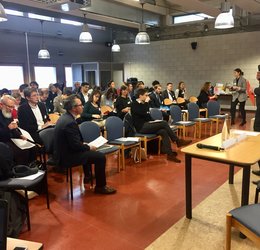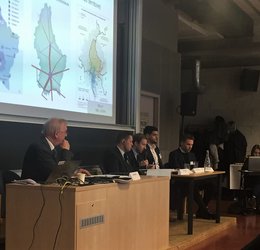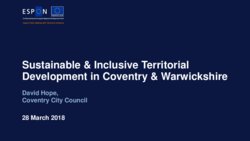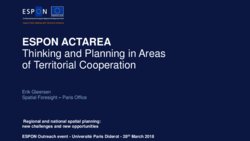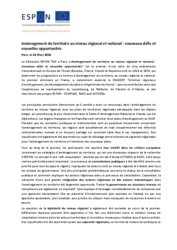Regional and national spatial planning: new challenges and new opportunities
Venue
Paris, France
RIATE, University Paris-Diderot
75013 Paris
France
The ESPON TNO Seminar in Paris “Regional and national spatial planning: new challenges and new opportunities” was the first in a series of five transnational outreach events in Western Europe (Benelux, France, Ireland and UK) in 2018 and 2019, examining new developments in terms of national and regional spatial planning. This first seminar in France particularly examined the SRADDET “Schémas régionaux d’aménagement, de développement durable et d’égalité des territoires” and brought the contribution and exchange of experiences from representatives of Luxembourg, Wallonia, Flanders and Ireland, as well as researchers from the ESPON projects COMPASS, ReSSI and ACTAREA.
The key conclusions were that there seems to be a renaissance in regional spatial planning, with new regional spatial plans being developed in Belgian regions, Luxembourg, and most recently the completed National Planning Framework in Ireland. French Regions and the Netherlands will complete their new spatial plans in 2019. While legal and institutional contexts are continuously moving when it comes to spatial planning matters, the fact that those regions are currently experiencing institutional reforms led to a shared discourse about how to face those changes. Concerns were also raised about the misalignment between the need of regional capacity for spatial planning and the expected ambitious of the new plans.
Throughout the day, participants expressed their interest in European benchmarks regarding spatial planning strategies, which is a major dimension of ESPON research. The concept of soft cooperation, illustrated by the ACTAREA and ReSSI case studies, was seen as particularly important. The process of public consultation has been identified as a priority for all countries and regions, engaging civic actors at the regional level and deal with multi-level governance. One particular issue is the scope of the consultation and how to engage regional stakeholders in the consultation process. However, the need for a greater inclusion of regional stakeholders and economic players in spatial planning was widely shared. Dealing with multi-level governance is also an imperative. This means a careful consideration of balancing a top-down approach linked to investment potential (e.g. Ireland) or a more localised bottom-up approach closer to the citizen but lacking resources to implement. The question of legitimacy of the regional level was also raised during the day. Different answers can be provided if one makes a distinction between the best level for internal cooperation between territorial actors and the best level to compete with other entities. Concerns were expressed regarding the regional capacities, in terms of political and financial resources, to implement the spatial planning strategies. Regions may then be led to request access to local resources, such as the support from universities in the case of Wallonia. Financial resources are also important, as one participant put it, but planning strategies often follows funding instead of the opposite. The articulation between regional planning strategies and other comprehensive approaches – such as environmental protection strategies, for instance – has also been identified as a key challenge.
This first seminar in a series of five on spatial planning centred around processes of developing spatial plans at the regional and national level and there was a great deal of attention to the similar challenges faced by all regions and countries and the methodologies involved in developing spatial strategies.

